Posts Tagged ‘Memphis’
Black History Month: Bringing home, home
As part of Black History Month, we’ve asked a few of the youth in the refugee community to tell us their experience learning about it. At World Relief, we work to honor and include all cultures and heritage, and celebrating Black history is just one way to do so. The second in a series of three, Reachaell, whom we spoke to in June as well, tells us about her own culture and how it ties into Black history.
Growing up in Africa, the life Reachaell has now was a far-away dream. As a child, she and her friends would go get water, and, amidst games of hide-and-seek, they would be playing another game as well—one where they would have to hide food under their bed to make sure no one would touch it.
When the opportunity presented itself to come to America, Reachaell was thrilled. After hearing the rumors of it in their refugee camp in Uganda, the U.S. seemed like a dream.
“We heard everything they were saying, and I was like, ‘Am I dreaming? Is this real?’” said Reachaell, who came when she was 14. “When I saw the plane sitting there, I was so excited.”
Despite the big change that it would bring and the family and friends that she would miss, Reachaell knew what it meant to be able to go to America. Her grandparents and uncle were already there, and, by coming to Memphis, the rest of the family would have a chance at a different life after having fled the Democratic Republic of Congo years earlier.
“[My grandparents] came to America for the same reason why we came. In Africa, there were people dying. They don’t have food. They don’t have homes to live in,” Reachaell, now 18, explained. “To come here, it’s a chance. It’s an honor.”
However, it does not mean that everything was always easy. When she arrived four years ago, Reachaell had never had the opportunity to go to school before, and she only spoke her native language of Swahili.
Yet in just four short months, she had already learned English thanks to a teacher who also spoke Swahili, and it opened the door for her to learn about other topics such as Black history.
“They talk about Black history in school, and it’s important to learn about [it.] It’s important because you really want to know what’s going on, what’s happening and stuff,” said Reachaell, who is now a senior at Douglass High School.
As a student attending school for the first time in her life, she was suddenly introduced to subjects and people she had never before heard about: Martin Luther King. Jr, Rosa Parks, the Civil Rights Movement.
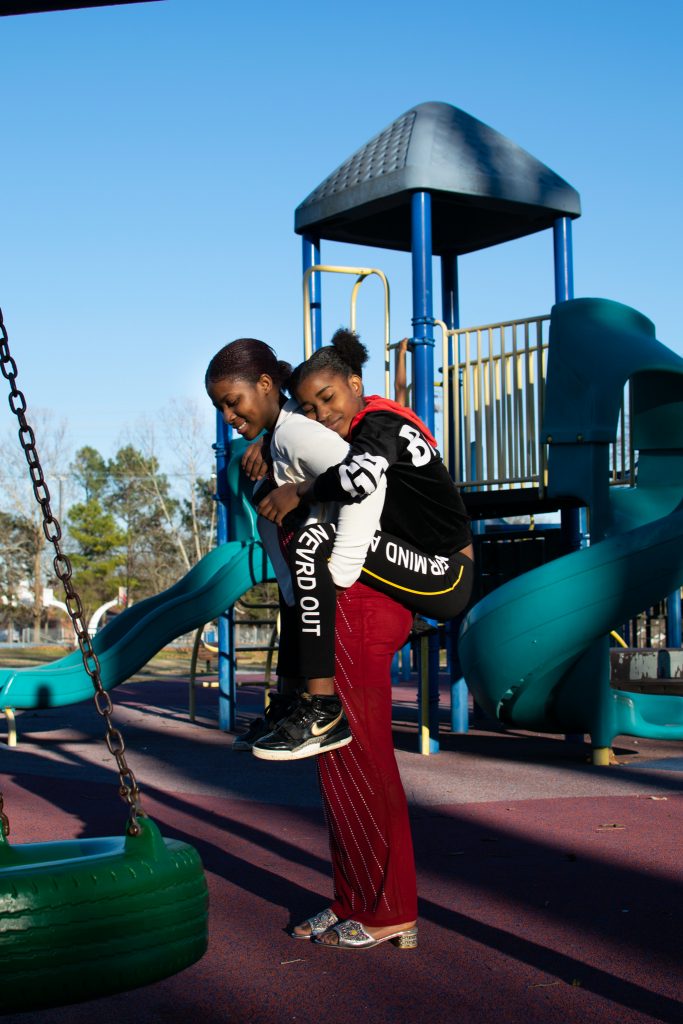
At the same time that she was learning about these iconic moments and the role models of Black history, she was also realizing the role she had to play in it too: “I’m here, so I feel like I’m a part of it.”
As a result, she would one day like to see her own culture represented here. Reachaell noted that when people speak about Africa, they tend to speak only about the poverty that is there. However, there is so much more to be celebrated than that, and it can be included in Black history as well.
In fact, her own role model, Zuchu, is a singer from Tanzania. She was the first East African female artist to receive more than 100,000 subscribers in a week, and she was recently named one of BBC’s 10 African music stars to watch for in 2021.
“I sing sometimes, and I would want to be like her,” said Reachaell, who started singing at the age of 6. “She works really hard, and she makes good music.”
This is just one small piece of culture and history that Reachaell has brought with her from Africa. Yet if there is one thing that she would take from the U.S. to her home, it would be school. The opportunity to learn, and to learn about Black history, is something she wishes everyone could experience.
“It’s not that I didn’t want to go to school, but my mom didn’t have money to pay for it,” said Reachaell. Instead, as the eldest of six children, she would stay home and care for her brothers and sisters.
“There’s a lot of things to learn. The [English] language, everything. History.”
Moving forward, it is no doubt that history will continue to evolve, and people everywhere will continue to learn from it. Perhaps one day, these stories will be included as well. For now, World Relief Memphis will continue to honor Black history and the diverse cultures around us not just in February but throughout the year.
Bailey Clark serves as the Communications Coordinator for World Relief Memphis. With a background in journalism and advertising, she is passionate about storytelling and its power to make a difference.
From learning to leading: former refugee gives back to community in time of need
World Relief Memphis has several community ambassadors who are helping to connect former refugee and immigrant groups in the city of Memphis. Our bilingual ambassadors connect members of these communities with resources in their languages, which is especially important now as the pandemic continues to affect our daily lives. They are sharing important information to help prevent the spread of COVID-19 in addition to providing resources to alleviate food security, access relief efforts, or transition to virtual school. Last time, we introduced and highlighted the work being done by our Spanish-speaking ambassador, Diana. Today, we’d like to introduce you to Arwa, our ambassador to the Arabic community.
Six years ago, Arwa arrived on American soil with her husband, two baby girls and mother-in-law in tow. Originally from Syria, Arwa’s family were the first Syrian refugees to arrive in Memphis, but the process to get here was not as simple as a plane ride from one country to another.
Having grown up surrounded by a large family, Arwa had never imagined that she would one day have to leave her mother and all but one of her seven siblings behind. Yet as the situation in Syria grew increasingly more dangerous, Arwa and her husband, Shadi, decided that it was time to leave the war-torn country in the hope that their children could learn and explore about the world rather than fearing for their safety.
However, deciding to leave was only the first step for the family. Once this decision was made, they then had to escape Syria—on foot. Pregnant with their second child, Arwa walked eight hours across the rural countryside to cross the border into Jordan with Shadi and her daughter by her side. Like any parent, Arwa and her husband thought only of their children’s safety as they made the treacherous cross-country hike into a new world.
In Jordan, Arwa’s family experienced a waiting period as their paperwork was prepared. Because the Jordanian culture was similar to that of their home country, the transition was relatively easy compared to what was to come. In fact, realizing the incredible life change that awaited him on the other side of the Atlantic such as learning an entirely new language, Shadi momentarily doubted whether or not he had made the right decision in bringing his family to the United States as they prepared to board their flight to a new world.
Upon their arrival in the U.S., Arwa and her family were welcomed into the Memphis community by World Relief and fellow Memphians. Two American families helped introduce Arwa and Shadi to the culture and customs of the South. Speaking no English, the couple immediately began learning the language thanks to the help of their American friends, who encouraged them to speak openly and confidently despite the mistakes they made, reminding them that native English speakers make mistakes too.
Over time, these families grew to be close friends of Arwa’s as they adjusted to a new life in Memphis, where everything from the language to the clothes to the food was different from their former home. No longer could Arwa eat pomegranates straight off the tree as she had done since she was a child, nor could she see her mother every day as she was used to. Now, she and her husband were forced to develop a new network and community in Memphis on which they could rely while being so far away from their family.
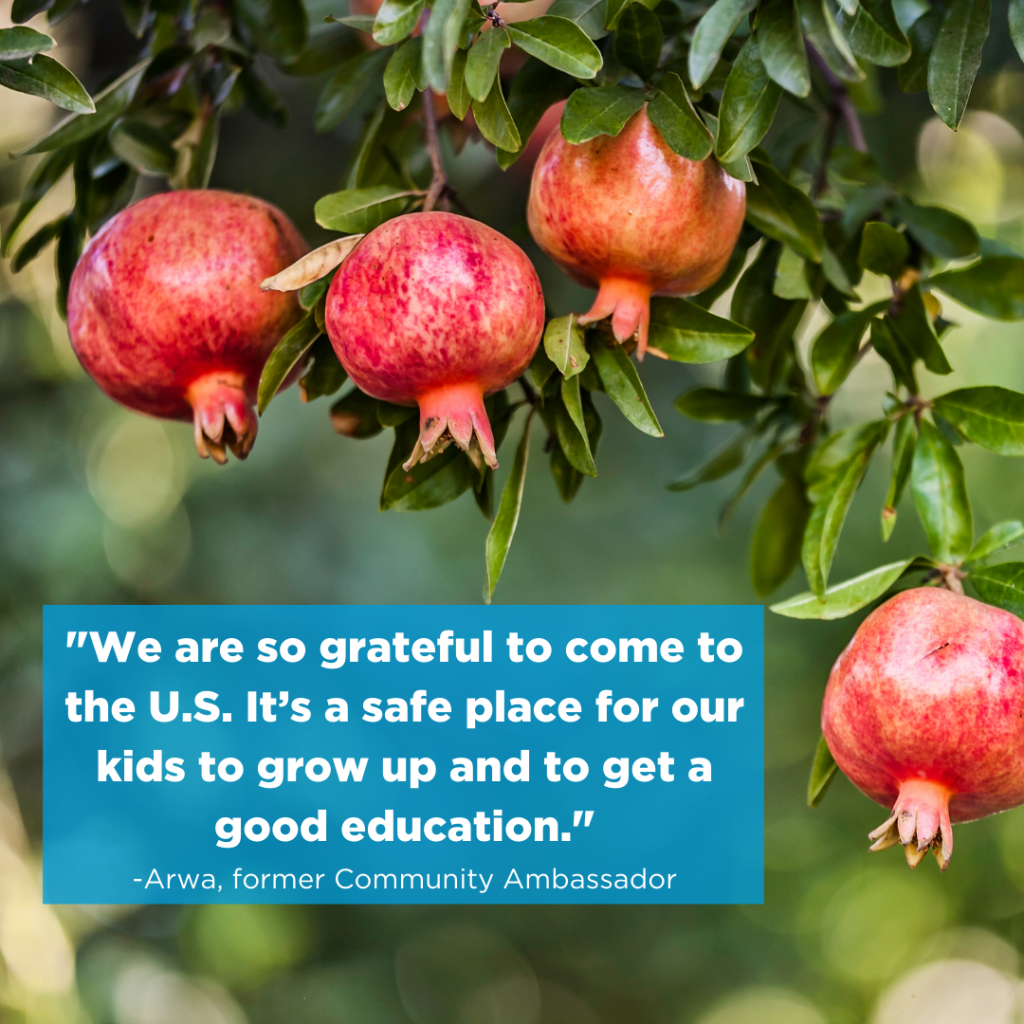
Despite the constant worries about their families’ safety in the Middle East, Arwa and Shadi eagerly set about rebuilding their life in the U.S. Thanks to her childhood English grammar lessons and her new American friends, Arwa was able to quickly pick up the language in addition to her native Arabic. As she and her family slowly grew accustomed to Southern American culture, Arwa began helping other Syrian refugees when they arrived in Memphis. Much as World Relief and those families had shown her the ropes, she began doing the same for others, helping them navigate American society and discover the resources available to them.
Once new to this land, Arwa has now become a leader to others who arrive in the Arabic community, using her English skills to assist them with applications for car insurance, WIC programs, food stamps and school registration. Since becoming a community ambassador for World Relief, she has also begun sharing information about the current crisis such as how to slow the spread of COVID and how to address food insecurity or changes in the public school system.
A teacher herself, Arwa understands how important it is for children to receive an education, and it was important that others in her community learn how they can continue their schooling from home in the middle of the pandemic. Despite the changes in the past year, Arwa still expects her children to perform well in school just as her mother had expected of her and her siblings all those years ago. She also hopes that the U.S. will continue to be a safe place for her kids to grow up and receive a good education with people of all backgrounds, and Arwa herself hopes to do the same one day by returning to university. Having fled Syria while she was in college, she aims to finish her bachelor’s degree by the time her children finish theirs.
Regardless, Arwa and Shadi have worked hard to build a life for their two daughters and son, who was born in the U.S., much like any parent would. Now an Arabic teacher at the Pleasant View School, Arwa and her husband have created a community for themself in this new world that they so bravely entered in order to offer their children a safe life with more opportunities. While she continues to hope and pray for the war in Syria to end so that the rest of her family might return to a normal life in her beautiful home country, Arwa also continues to invest in the local Memphis community, with both Americans and other Syrians or Arabic-speakers.
As a community ambassador, she has already helped so many as they adjust to this particular period of life just as those two families helped her adjust six years ago. In November, Arwa became a U.S. citizen, the first of the Syrian community in the Memphis area to do so. As other members become eligible to request citizenship, they will undoubtedly continue to look to her for guidance in this process as well.
By becoming citizens, Arwa and her husband are one step closer to providing the life for their children that they dreamed of as they fled across the Syrian border nearly a decade ago. At World Relief, we are so glad to have their family in Memphis today, and we are thankful for the ways that Arwa is helping to inform and connect the Arabic speaking community.
Sarah Barnett was the former Mobilization Intern for World Relief Memphis and is a senior at Furman University in South Carolina. She majors in Political Science and Spanish and is passionate about influencing where people and policies collide.
Bailey Clark serves as the Communications Coordinator for World Relief Memphis. With a background in journalism and advertising, she is passionate about storytelling and its power to make a difference.
A caring community: from Tanzania to Memphis
World Relief Memphis has several community ambassadors who are helping to connect former refugee and immigrant groups in the city of Memphis. Our bilingual ambassadors connect members of these communities with resources in their languages, which is especially important now as the pandemic continues to affect our daily lives. They are sharing important information to help prevent the spread of COVID-19 in addition to providing resources to alleviate food security, access relief efforts, or transition to virtual school. We’ve already introduced you to Arwa and Diana, and today we’d like to introduce you to Estella, our former ambassador to the Kinyarwanda-speaking community.
Growing up in a refugee camp in Tanzania, Estella had never imagined that she would one day have the education that she had always dreamed of. As a child, Estella and her friends would help each other complete their chores before running off to play together, always being sure to take care of one another within their community despite the different backgrounds. As she grew older, this notion of a sweet, caring community stayed with her—from her childhood in Africa to her time at the University of Memphis and still now.
Originally from Burundi, Estella and her family, including 10 siblings, arrived in Memphis 12 years ago when she was just a teenager with hopes of a better life, having heard how great the United States could be. What they didn’t know, however, was the amount of work involved in order to achieve success here. But, not one to back down from a challenge, Estella has worked diligently towards her ambitious goals of having a university degree and establishing a career.
Even with the language barriers that she faced, Estella was not stopped from learning and participating in university life. In fact, she credits her time at the U of M as being one of the most formative experiences for her because she was able to assume leadership positions across campus and continue improving her English. In doing so, Estella was able to not only build her résumé so that she might one day find a job but also to build a new community such as the one she found through dancing.
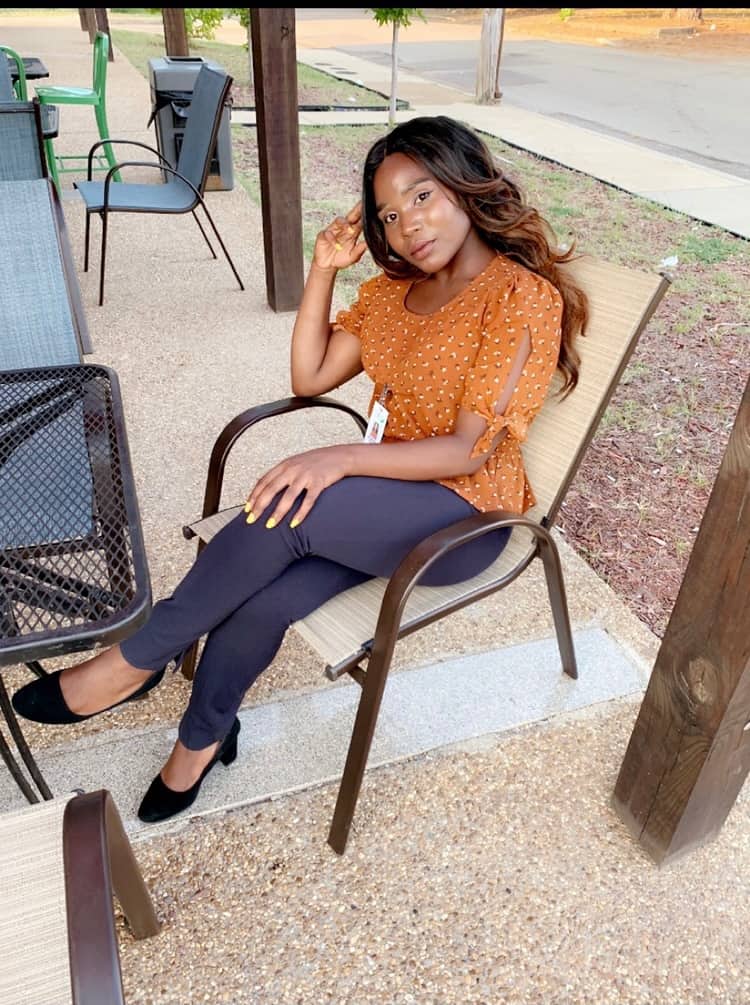
There, Estella discovered a welcoming group that allowed her to showcase her culture while also transcending language barriers and learning about American culture as well. For her, it was a way to express love, and it also allowed her to build a strong network around herself just as she had done in the former refugee camp.
Having completed her degree in international business, Estella has begun working as a business manager at PFSweb Inc., ensuring that her company fulfills its obligations to its clients. She has already fulfilled two of her life-time goals, and yet she’s not stopping there.
With a commitment to life-long learning, she has now decided to help others learn as well—whether it be at school or elsewhere—just as those at the U of M had helped her. As a community ambassador for World Relief, Estella has been able to help former refugees from Rwanda and Burundi as they navigate the ins and outs of the American system and culture, especially in the current pandemic.
For those with school-aged children, Estella has helped translate between teachers and parents in addition to helping distribute donated backpacks to members of the community. For others, she has helped with applications for financial relief or food stamps.
Yet perhaps most importantly, she has been sharing information about COVID-19 and its impacts on both the health and employment prospects for those within the Rwandan and Burundi community in Memphis. She brings awareness to resources that they may not be aware of in addition to information about community safety in the midst of a pandemic such as social distancing and the importance of wearing a mask. Because many of the jobs held by community members aren’t conducive to social distancing, these resources have been essential within the local community as they work to provide for their families while simultaneously staying as safe as possible. Through the help of generous partners of World Relief, Estella has also been able to distribute masks in order to help keep her community safe at work and in their daily lives.
As her time as community ambassador for World Relief ends, Estella hopes to continue to help those in her local community, just as she once did as a child in a refugee camp in Tanzania. Having completed university, established a career, and obtained citizenship, she can continue to be a role model for those around her, demonstrating that hard-work and a passion for life-long learning can take one a long way, no matter the starting point. We are immensely thankful for all the ways she has already helped to serve and contribute to the success of members of her community!
Sarah Barnett was the former Mobilization Intern for World Relief Memphis and is a senior at Furman University in South Carolina. She majors in Political Science and Spanish and is passionate about influencing where people and policies collide.
Bailey Clark serves as the Communications Coordinator for World Relief Memphis. With a background in journalism and advertising, she is passionate about storytelling and its power to make a difference.
Keeping communities connected during a pandemic
World Relief Memphis has several community ambassadors who are helping to connect former refugee and immigrant groups in the city of Memphis. Our bilingual ambassadors connect members of these communities with resources in their languages, which is especially important now as the pandemic continues to affect our daily lives. They are sharing important information to help prevent the spread of COVID-19 in addition to providing resources to alleviate food security, access relief efforts, or transition to virtual school. We would like to introduce them to you and highlight the incredible work they are doing, starting with our Spanish-speaking ambassador, Diana.
Argentina, Chile, Ecuador. Originally from Venezuela, Diana Sanchez’s family is now scattered across the Western Hemisphere after being forced to leave their home country due to the humanitarian crisis and resulting political and economic difficulties there. Today, all she has left of them is the stories she has heard about their lives in these new countries and the memory of spending time with them while eating her mother’s homemade arepas.
Yet despite the thousands of miles separating her from her family, Diana has learned that there is another type of family—one that is found in the community surrounding you. Since arriving in Memphis four years ago as a refugee, Diana has found another home within the immigrant community here, in part due to her time as an English student at the Connect Language Center.
There, Diana connected with other refugees and immigrants who were looking to improve their English and rebuild a life for themselves in the U.S. Because classes at the CLC are not divided by national origin or native language but rather by English ability, Diana was able to meet people from various backgrounds. As they shared about their lives little by little during vocabulary practice or other class activities, students began to form friendships with one another by encouraging each other in their journeys toward integration and acquiring English as a second language.
As a result, Diana began to build a community—and family—of other refugees and immigrants from various backgrounds. Over time, she connected with others in the Latinx community as well, in part thanks to social media. Facebook pages are often used as a networking resource to connect this tight-knit group of immigrants in Memphis. When a problem arises, people know exactly who to contact within the Latinx community. Because of the diversity of countries and situations represented among Spanish speakers, there are people who have been in Memphis for a long time who can help those who have arrived more recently or under more dire circumstances.
Over time, Diana became one of the family leaders for this community within Memphis. As any family member would, Diana began sharing resources with others in need, starting by sharing language resources with the rest of the Spanish-speaking community after her own success with improving her English at the CLC. Many people have been here for years without learning more than how to order in a restaurant or give and receive directions, and the benefit from language instruction at all levels is incredible.
Yet when the pandemic struck and World Relief began looking for community ambassadors, Diana had another opportunity to give back to the Latinx community. By using the active social media pages, Diana has been able to spread the word about available resources, including those provided by World Relief.
Through her work, many families have been made aware of ways to improve both their physical and mental health during the pandemic. Diana has spread the word about food banks, school materials through Shelby County schools, flu shots, free COVID testing, and resources for improving mental health such as the value of going on walks, getting out of the house, and staying connected to the community while maintaining social distancing protocols.
While this immigrant community will never replace her family, it has become incredibly important to her, and acting as a Community Ambassador to the Spanish-speaking community has been one way to give back. Diana aims to continue connecting those in her community with tools and resources to ensure their success, and she is proud of the ways that she has been able to do so through the support of World Relief and the help of digital platforms that allow for easy communication during the pandemic.
One day, Diana hopes to develop her hair stylist business in order to help her family and others. In the meantime, she will continue to improve her English and connect World Relief’s resources to those she knows who are in need of the extra support. 2020 was the first time that the Memphis team utilized community ambassadors to reach broader immigrant communities, and we are so thankful for her work and passion for developing these connections!
Sarah Barnett was the former Mobilization Intern for World Relief Memphis and is a senior at Furman University in South Carolina. She majors in Political Science and Spanish and is passionate about influencing where people and policies collide.
Bailey Clark serves as the Communications Coordinator for World Relief Memphis. With a background in journalism and advertising, she is passionate about storytelling and its power to make a difference.
Internships that inspire and transform
Although Noah Rinehart grew up in Memphis, he had never heard of World Relief and didn’t know much about refugees. But once a community service coordinator at Rhodes College recommended it to him based on similar evangelical beliefs, he was intrigued. He ended up interning for six semesters and the summer of 2017, and the resulting experience was less about an academic interest and more about development of his practical life skills and personal growth. He appreciated the chance to broaden his horizons and spend time outside of the Rhodes community, providing perspective and a welcome change from a rigorous and sometimes elitist academic environment. As he learned to navigate government offices and cultural barriers, he also saw the intense challenges faced firsthand by refugees which would cause them to flee their homes. Their challenges do not end with arrival in the United States, but change as they must learn to navigate bureaucratic hurdles, apartment leases, employment contracts, and quite often a language barrier too.
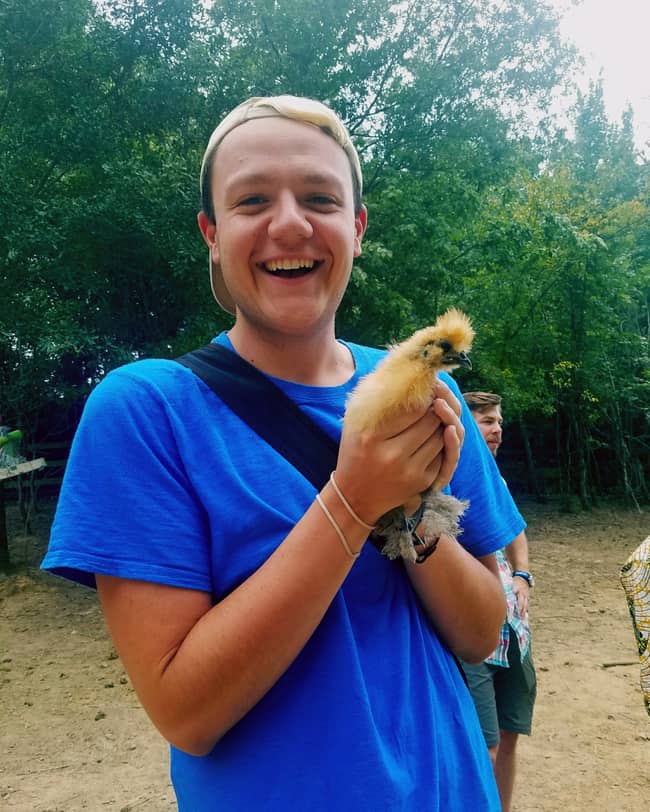
The relationships Noah built with other interns, staff, and program participants were highlights of his experience at World Relief. One of his favorite memories is being in the car with the other summer interns as they drove to an apartment complex where many resettled clients live. When they arrived, an older Syrian man whom they knew through World Relief was riding around the parking lot on a tiny child’s bike! When he recognized them, he just waved with no explanation. They were not even there to visit him, but his playfulness gave them a good laugh and turned an otherwise ordinary day into a memorable one.
Several clients stood out in Noah’s memory as he reflected on his time at World Relief. He remembered a mother and daughter from East Africa with whom he spent a lot of time at their appointments. He was impressed by the mother’s gracefulness and composure. She was never in a hurry for anything, even when they were running very late! While at the DMV one day waiting for an ID card, he struck up a conversation with the daughter, who was getting ready to start ninth grade at a new school. As it ended up, he had attended a school in the same district. He was able to encourage her and tell her about her new school, making her transition to high school a little easier.
As a religious studies major at Rhodes and a Christian, the faith-based aspect of the internship appealed to Noah. He was amazed to learn the sheer number of times the Old Testament admonishes Israel as God’s people to care for the stranger and foreigner among them, and how that command applies to God’s people today, the church, as well. He enjoyed learning more about the church’s role in serving their neighbors, and in many cases their brothers and sisters in Christ. Sometimes it was difficult and discouraging to engage in this space, as he had a front-row seat to seeing churches’ varied reactions toward questions of immigration. On one hand, he was encouraged by those who had chosen to step up and care for their neighbors the way that God calls the church to love them– all of them. But on the other hand, he was also discouraged by those who rejected the call to action and continued to perpetuate hurtful and exclusionary policies toward the foreigner. He came to view loving the stranger as a non-negotiable in the Christian faith through this experience and has taken this view with him in his post-grad endeavors in college ministry.
Being able to work with other Christians operating under similar priorities was one of Noah’s favorite parts about the internship. The staff serves refugees because of Jesus’ commands to love their neighbors, especially the most vulnerable in our communities. The nature of service work is confronting hard situations daily, but Noah was grateful for a supportive office community who helped him think about these challenges in a healthy way, without being consumed by the weight of it all. When he worked here in 2017, the challenge was lowered quotas and declining public support for immigration, but he felt like the office was overall optimistic and flexible to the required changes. He was inspired by the sense of hope he still felt as the general attitude was to trust in the Lord’s provision despite the fact that lowered visa numbers made for a discouraging couple of years. Through this experience, he came to appreciate turning off the news and actually engaging with immigrants in our communities. He found that the relationships built in this way are the ones which are most impactful and mutually transformative.
We are always looking for interns to join our team and learn more about what we do. Noah recommends this internship to anyone looking to grow in their cross cultural abilities and to see the heart of God as they engage with refugees in the Memphis community. Sound like you or someone you know? Check out our internships page to learn more and apply.
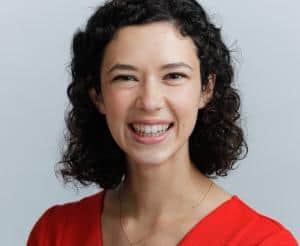
Sarah Barnett was the former Mobilization Intern for World Relief Memphis and is a senior at Furman University in South Carolina. She majors in Political Science and Spanish and is passionate about influencing where people and policies collide.
When God gives: the story of Ruth and Dieudonne
Ruth and Dieudonne met and got married in the Gihembe Refugee Camp. Both their families found refuge there in 1997. They were there “for too long” – and most of their family is still there.
“They don’t have a chance to come. If they had a chance, yes, they would want to come.”
Dieudonne and Ruth both sang in the choir at church and her brother was neighbors with Dieudonne, whose name means “God gives.” They would often see each other during the day and week. The two were married in 2015 at a small ceremony of family and close friends. In 2016, Ruth’s family was notified that they would be going to America. Because Dieudonne and Ruth had only recently gotten married and not filed together, Ruth needed to go with her sister, brother, and mother to America. Before she left, she went through the required medical exams and tests. She found out she was pregnant, and at a follow-up ultrasound, they discovered it was twins! Dieudonne said goodbye to Ruth before she got on to a bus with others headed to the airport.
“When couples say goodbye in the waiting area, usually they cry. Ruth cried. I hid my emotions. Her sister and her friend Lillian cried too.”
With separate cases, Ruth and Dieudonne still held on to hope that they would one day be reunited, but they did not know when.
Ruth and her family arrived in 2016. Arrey Kelvin Bissong was one of their assigned World Relief Good Neighbor Team volunteers. An immigrant from Cameroon, he was not able to welcome Ruth and her family at the Memphis airport because of work, but he rushed to meet them the next day. One of Ruth’s siblings speaks French, and they were excited to hear a familiar language when Arrey Kelvin spoke French to them that day. He invited them to his church, and the church welcomed them eagerly in the coming months. Everyone took care of Ruth. There were doctors’ visits, World Relief appointments, and job hunts. The first few months of arrival are always overwhelming, and having a new circle of community to care and comfort is essential. Through a difficult pregnancy, early delivery of the twins and time at the hospital, Dieudonne was present via WhatsApp calls and texts. He longed to hold his babies and be with his wife. “Each week, we talked together on the phone with the kids, on video. It is family. It felt like family.” Ruth and Dieudonne decided to name their twins after Arrey, to honor his role in their lives as such support in Ruth’s transition to America. Their son is named Kelvin and their daughter is named Kelvine.
“What was the hardest part about being away from them for those years, Dieudonne?”
“Everything.”
The twins began to babble, speak their first words, take first steps, and grow up. After years of texts and calls, there was word that Dieudonne’s case was moving forward. They finally got the call. Ruth prepared to reunite with her husband and start their life together in America. The case still took a while, and they waited eagerly.
The night finally came at Memphis International Airport. World Relief staff, family, and Ruth’s community in Memphis gathered together. Kids ran around with little American flags, friends embraced and shared their excitement for Ruth.
Passengers of the same plane slowly appeared and walked past. There was a whole crowd awaiting one man. At the first sight of Dieudonne, the security guard had to persuade Ruth to stand behind the specific “no entry” line across the floor. Overcome with emotion, friends and family screamed and cheered, as Dieudonne passed over the line into Memphis, Tennessee, embracing his wife after more than three years. Shy little Kelvin and Kelvine shuffled forward to meet their father for the first time in their lives. He scooped them up in his arms.
“There were so many people. I was surprised to see so many people to welcome me,” Dieudonne reflected a year later.
Arrey has taught Dieudonne how to drive. Through World Relief’s Connect Language Center, Dieudonne has learned English so he can work and provide for his family.
“As a parent, I get to do everything. Pay for everything, go to work, take care of my family, praying, everything.”
Since their reunification, Ruth and Dieudonne have welcomed another son, Israel, into their home.
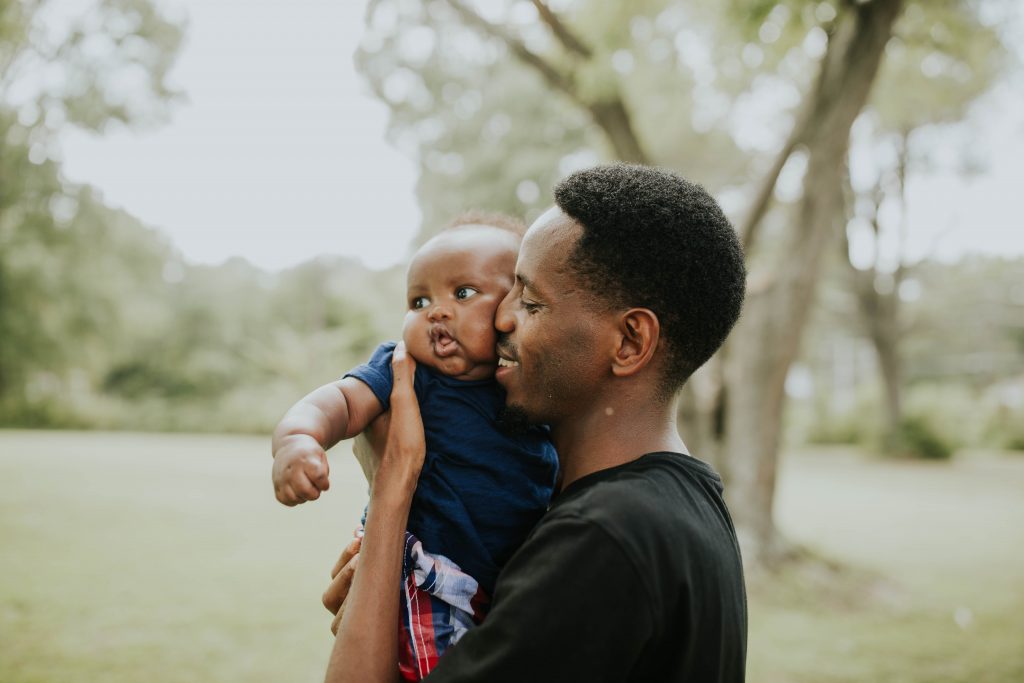
“On my side, with Israel, everything was perfect. Up close. Getting to see him grow. The twins are already grown. I was there [on WhatsApp, but it was] totally different. Ruth had her mother and sister, but now I’m here!”
When asked what he hopes for his children, Dieudonne answered, “I pray for their future. To grow in the hands of God. To live in harmony and peace. That their futures be bright.”
What would you say to Americans learning about refugee resettlement?
“Let families reunite! It’s a big gift for kids to have both parents!”
Emily Frazier is a humanitarian photographer and gifted communicator. She seeks to educate, advocate and empower through her work, partnering with NGOs, non profits, and individuals to document the human experience with dignity. Emily has photographed for World Relief Memphis since 2017.
Youth Mentoring Program Launching in January
January is National Mentoring Month and we are excited to launch our new Youth Mentoring Program in partnership with the Memphis Grizzlies! Learn how you can join us a youth mentor – check out this video and read more here.
Shawnee McDonnell has always had a heart for vulnerable populations, especially refugees. After graduating last May from Missouri State University with a Global Studies major and minors in Latin American Studies and Spanish, she was thrilled to join us as an AmeriCorps Vista member. Her time at World Relief has already given her an important first-hand glimpse into refugee issues in the United States and the challenges of adjusting to a new and very different culture. She has drawn on her experience studying abroad in Costa Rica to help her understand, in some small way, what it is like to be in a new place and have to get around without really knowing the language. Combined with domestic volunteer experience in poverty relief, her background informs her work here at World Relief. During her term here, she is building a refugee youth mentoring program in the Memphis area from the ground up as part of a state-wide initiative.
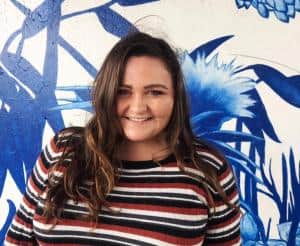
Our program will be one of several across Tennessee intended to provide additional support to refugees ages 15-24, who are navigating their own coming of age alongside the difficult transition into the United States. To prepare for the launch of the World Relief Memphis program in January, Shawnee has been researching similar programs across the country and best practices for youth mentoring. Through this, she has come to understand the importance of supporting refugee youth in their personal, career, and educational goals by giving them space to dream with a dedicated mentors and mentees. These mentors will be members of the welcoming Memphis community, including well-established immigrant communities. The program is voluntary, but we anticipate sustained interest among many of our eligible clients, as this fills an important role in creating opportunities for integration within our community.
For the first three months of the program, the mentees and mentors will meet in a small (virtual) group with the program coordinator as they get to know each other and build rapport. For the rest of their year commitment, they will continue to meet as a small group without the program coordinator as they set goals and learn new skills. They will also benefit from trainings and events held by the Memphis Grizzlies Foundation “Mentor Memphis Grizzlies.”
These relationships will contribute to the success and integration of these youth as they begin to establish their adult lives in the United States. We are excited to see how creating space to dream empowers these young people to pursue their passions. These achievements will contribute to the richness of our community and state, and even can contribute to breaking cycles of generational poverty.
Shawnee has seen first-hand how trust placed in someone can create a sense of pride and self confidence through her own work here and hopes to create a similar experience in this program. She has seen how the investment of a little bit of time and direction goes a long way in establishing a support network for those who are trying to figure out their next step in life. Therefore the confidence and knowledge she is gaining undoubtedly will serve her well in whatever she chooses to pursue once her time with us is completed, as she gains experience about the realm of non-profit service.
Does the challenge that refugee youth face resonate with you? Would you like to make a difference? Get started HERE.

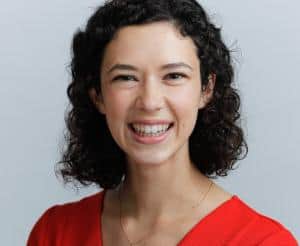
Sarah Barnett is the Mobilization Intern for World Relief Memphis and a senior at Furman University in South Carolina. She majors in Political Science and Spanish, and is passionate about influencing where people and policies collide.
Small Business Saturday & 2020 Gift Guide
At World Relief, we believe that every single one of us is made for change — both in our own lives and in communities across the globe. Throughout this holiday season, we’ve created a list of companies and products that embody our commitment to change in our Made for Change Gift Guide.
Each of these companies is committed to serving those in vulnerable situations by partnering with World Relief. When you purchase a gift from this gift guide, you’ll not only support the work of World Relief, but you’ll be investing in small businesses across the U.S as well.
So what are you waiting for? Shop the gift guide, and create the change you know you were made for.
17Berkshire – Memphis
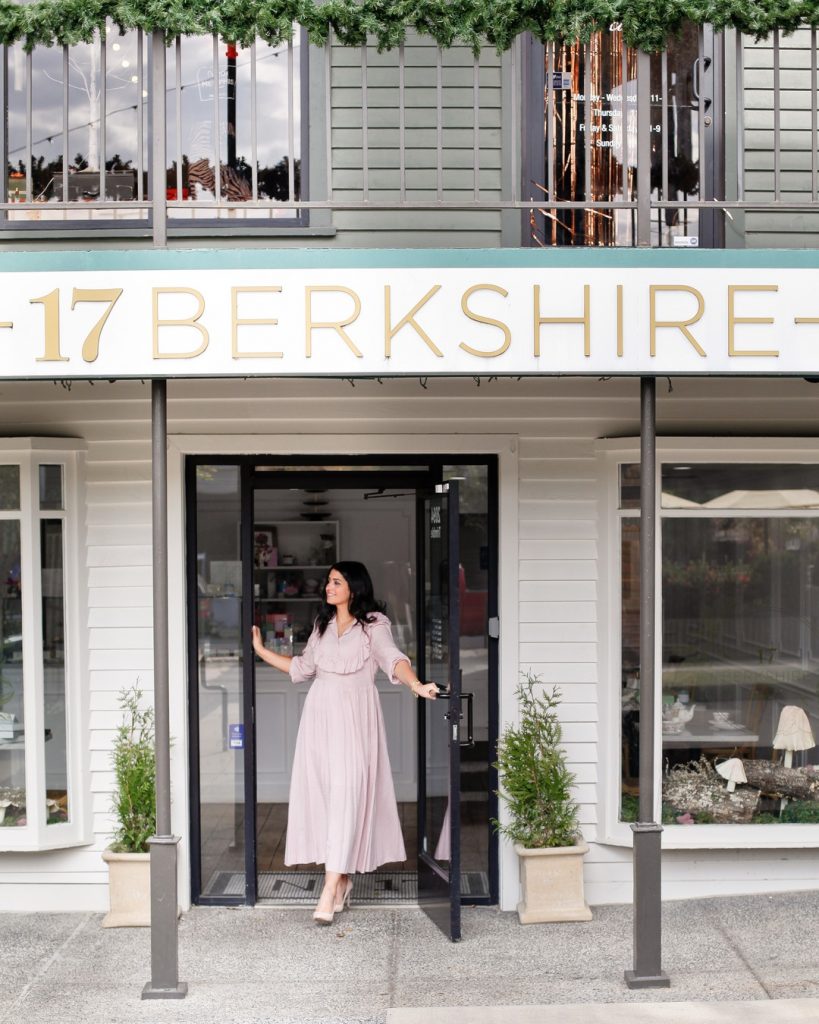
17Berkshire is a Memphis-made Patisserie on Overton Square offering European desserts with flavors nodding to both the deep South and Middle East. Treat the sweet people in your life with macarons, afternoon tea, specialty coffees, gift items in the shop, or gift card for future use.
prettyinside.
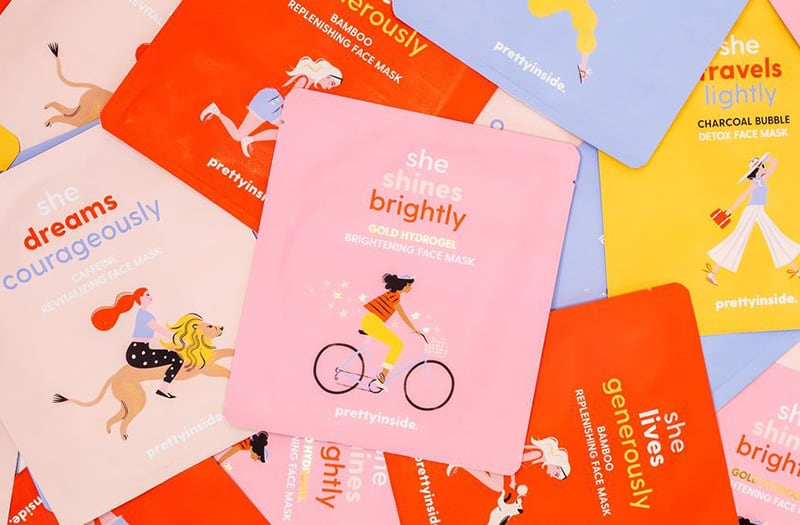
For the woman (or man!) in your life that wants their outside to shine as brightly as their inside, pick up a few face masks from Musee Bath’s newest line, prettyinside.
Prettyinside is built on the belief that all women are beautiful, that they are created in the image of God and that beauty is more than skin deep. Empower the women in your life to take a look in the mirror and channel their inner strength, courage and beauty. All prettyinside products are sourced with the best plant-based ingredients for your skin. The packaging is 100% recyclable, and a portion of all sales go to support refugee women through the work of World Relief. “World Relief is one of the foremost organizations addressing the needs [of refugees], and because this is a beauty brand and it’s targeted to women, I wanted to work with somebody that worked a lot with women and children. We are incredibly excited to be partnering with World Relief are so thankful for the work they do that makes a difference in the lives of so many women around the world.” – Leisha Pickering, founder
Pen + Pillar
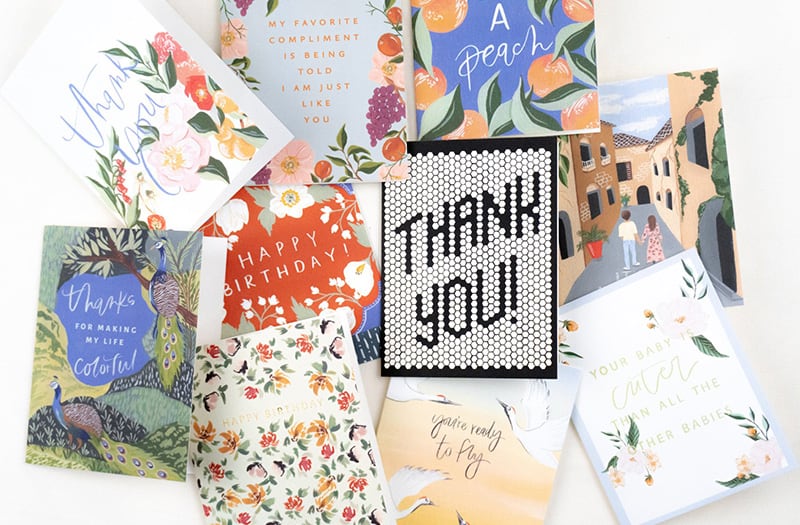
For the writer and kind-hearted giver in your life, shop owners Taylor and Justin have created a series of notebooks, greeting cards and art prints that your loved one is sure to enjoy. Each gift is inspired by Taylor and Justin’s love of nature, travel, community and warmth. A portion of each purchase goes to support World Relief!
InSenseUSA
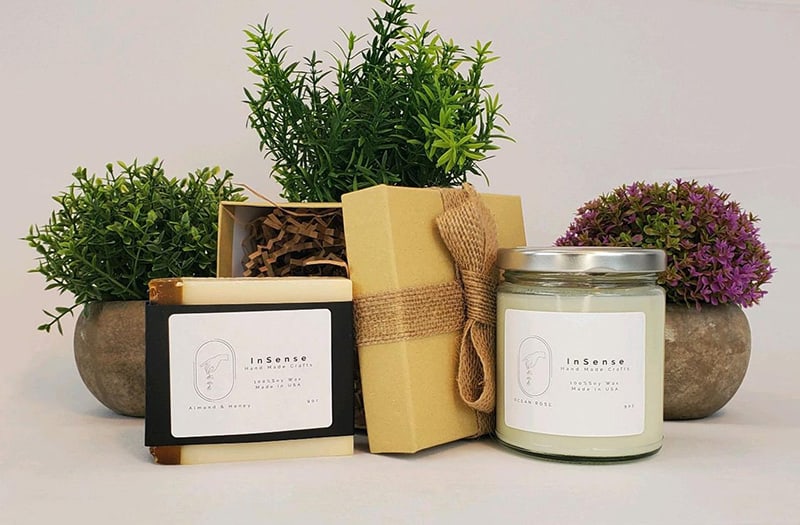
For the people in your life who need to indulge in a little self-care, InSenseUSA is your go-to shop. This collection of candles, soaps and bath bombs are all handcrafted with love in Wheaton, Illinois.
Shopowner Al Alsaadi and his parents fled their home in Iraq several years ago and were eventually resettled in the U.S. They got connected with World Relief, and with hard work and a resilient spirit, they rebuilt their live in the Chicago suburbs. Al is now a design engineer, part-time college professor and small business owner. He’s excited to give back to World Relief because of how much he feels World Relief has given to him.
“I am excited to give to World Relief simply because I wouldn’t be here, and I would not succeed in my life without World Relief. From the first day I came to the States up until to this moment — of having my own small business — Word Relief is on my side helping me. We are in this life to change someone’s life. We might be planning on doing it or not, but if we stop for a minute and think through it, we might have changed someone’s life just by smiling and saying good morning.” -Al Alsaadi
When You Can’t Go Home
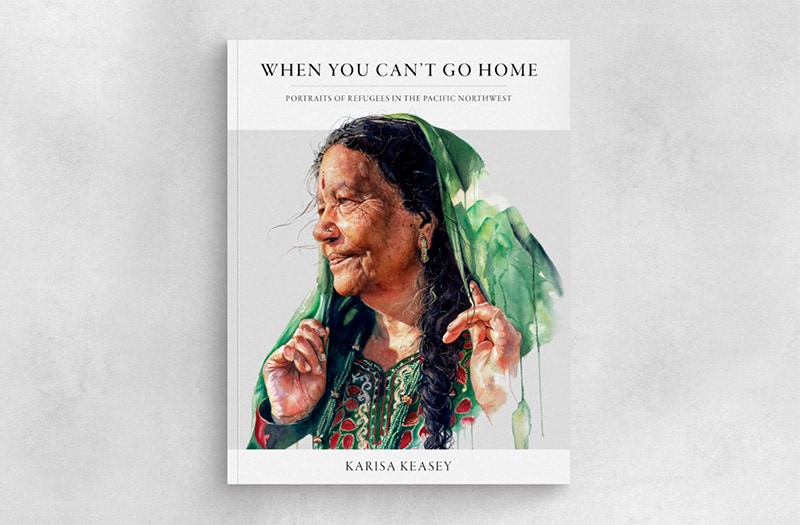
This beautiful book is perfect for the avid reader and art lover in your life. Seattle-based artist Karisa Keasey spent two years interviewing refugees and painting portraits to accompany their stories. She combined the artwork and stories in this stunning book you can purchase on her website. 50% of the profits will be donated to World Relief.
“These are tough times right now and we are all in need of healing. Healing happens in community, and community happens by pouring into others. World Relief embodies this community and knows what it is like to walk alongside some of the most vulnerable.” – Karisa Keasey
Refugee Bath Co.
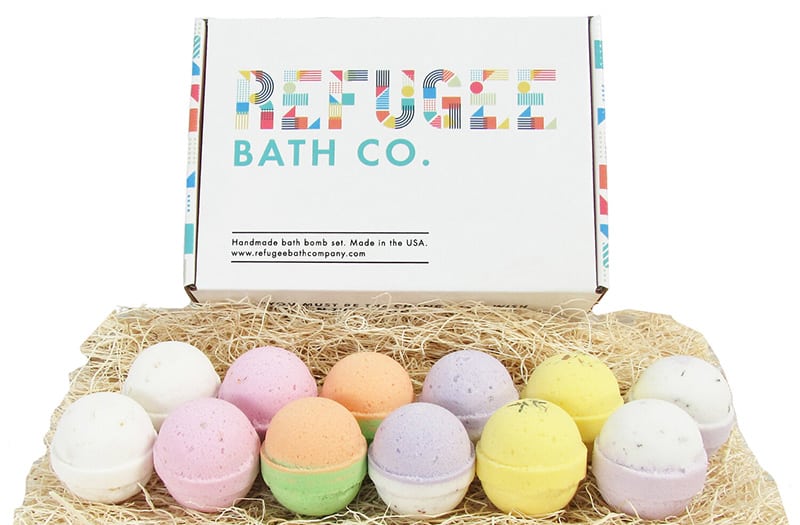
Love. Energy. Nourish. Soothe. These are just a few of the words used to describe the bath bombs from Refugee Bath Co. whose mission is to provide opportunities for refugees in Washington to thrive.
Give the gift of fun and indulgence to a special friend or family member in your life, and why not throw an extra bath bomb set in the cart for yourself? When you enjoy these products, you make a difference in the lives of refugee women and men in the United States, as a portion of their profits are donated to refugee support services.
Amazon Smile
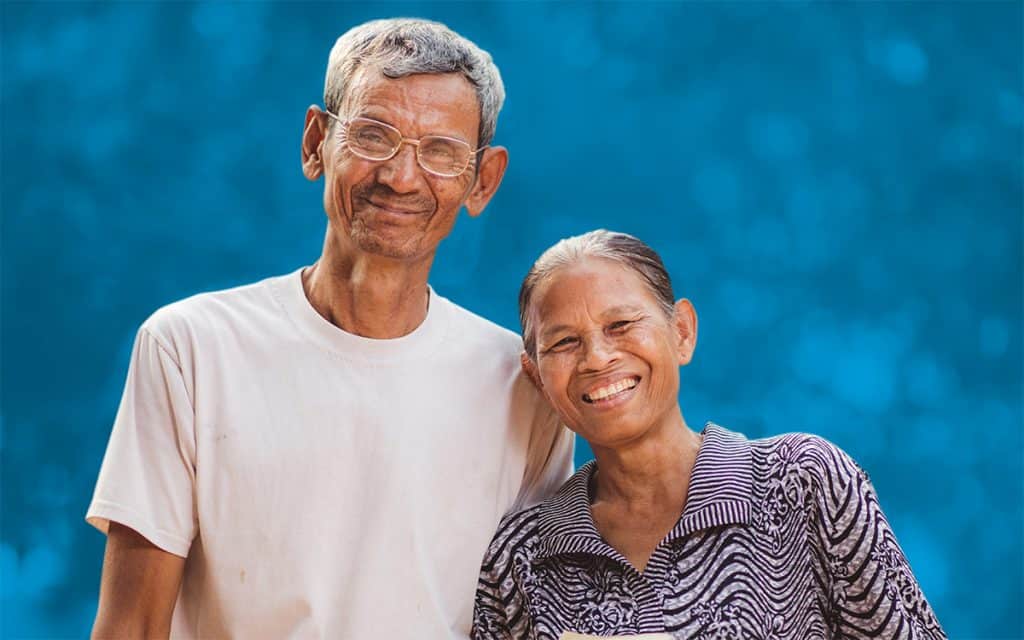
Did you know your Amazon purchases can support World Relief? They can through Amazon Smile! Every time an Amazon Smile customer makes a purchase, 0.5% of the price of eligible purchases will be donated to a charity of your choice.
If you can’t find what you’re looking for from one of the amazing businesses in this gift guide, or if you’re already shopping on Amazon, then follow the steps below to shop on Amazon Smile and Amazon will donate to World Relief on your behalf:
Visit smile.amazon.com and sign in to/register for your account
Type World Relief Corp. of National Association of Evangelicals as your selected charity
As you shop, be sure you’re using smile.amazon.com to make purchases (the same products are available on smile.amazon.com as on amazon.com or the mobile app).

Rachel Clair serves as a Content Writer at World Relief. With a background in creative writing and children’s ministry, she is passionate about helping people of all ages think creatively and love God with their hearts, souls and minds
WRM Internship Introduced Diverse Experiences, Skills, and Opportunities
Kristen Morris heard about World Relief during her time at Rhodes College. As a member of their City Link program, she volunteered in the Memphis community during three years of her college career. Her first year was spent in an elementary school, but after exploring her international studies major further, she wanted to shift her volunteer focus to connect more closely with her studies. Through her major, she developed an interest in immigration and wanted to get to know immigrants in her new community. This desire made World Relief a great fit for her. The program put her in touch with World Relief Memphis, and she volunteered here for six semesters, until her graduation in May 2020.
One of the things that stood out to her the most about her experience at World Relief was the collaborative nature of the nonprofit sector, both between organizations and with local churches. One of her classes had discussed the large number of nonprofits in Memphis and their collaboration with one another. She was able to see that collaboration first hand with World Relief’s connections to organizations such as Christ Community Health. She also enjoyed seeing the collaboration between churches of different denominations who all agree that they are called to work with immigrants and welcome them to the Memphis community.
Kristen spent her time at World Relief in the Employment and Casework departments. Through this work she interacted with program participants on a daily basis, through home visits and providing support at appointments. By her final semester of the internship, she had become the intern in charge of the Friends of Trezevant English Program. This program connects participants in the Refugee Elders program with residents of a local retirement community. The goal is fostering community and further developing English language abilities among the Elders. She was surprised and impressed by the willingness of the retirement community residents to give of their time and energy to their foreign-born contemporaries. And these relationships were important to her, too. She got to know the Elders participants through driving them to the class, and she even spent time outside of the internship at the retirement home with those she had met through the class.
Kristen credits World Relief for helping her develop professional skills, such as confidence, creative problem solving, and resilience. On her very first day of the internship, she was surprised at how much freedom she was given in accomplishing her assignments. But once she recovered from this initial surprise, she came to appreciate the freedom and the confidence it gave her. And when she made mistakes? They only helped her learn about herself and the graciousness of her refugee neighbors. Both the technical experience with refugees and the confidence she gained during her first two semesters as an intern set her up for successful adaptation of her skills for a program in Morocco in the summer of 2018. She was grateful for already having cross cultural experience, as she lived with a host family and worked in a very different culture from the one she was raised in. Ultimately, Kristen hopes to use all of this experience in her career, either in peace and development or in conflict resolution. We are grateful for her work with us and excited to see how she uses her skills in the future!
By Sarah Barnett, Mobilization Intern
Learn more about becoming an academic or summer intern with World Relief Memphis like Kristen and Sarah! Visit HERE for more information and to submit your application.
Semester Sparked Savannah’s Love for Different Cultures
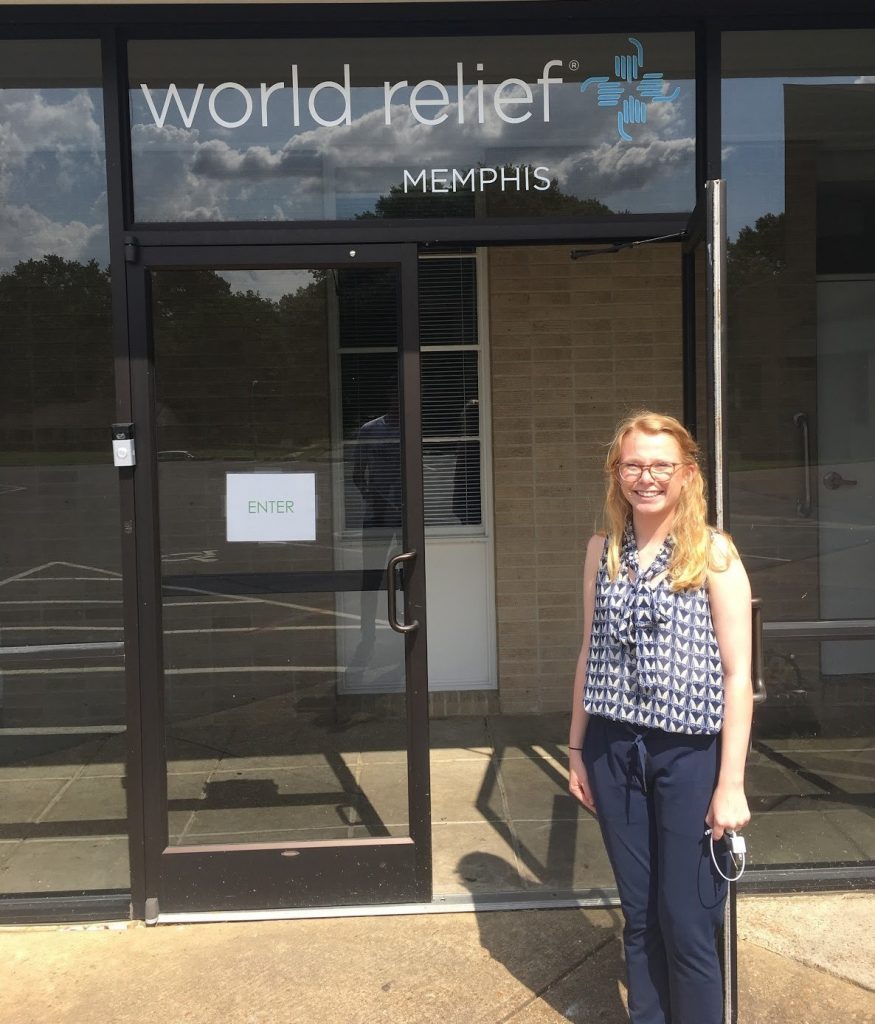
Savannah Day became interested in refugee resettlement through talking to a high school friend who was involved in a refugee resettlement program in Fayetteville, Arkansas. When she looked for a similar organization near the University of Mississippi, where she was a student, she couldn’t find one. After expanding her search to surrounding cities, she found World Relief Memphis. Her goal was to learn more about social service providers and to be exposed to people from different cultural backgrounds. During her time at World Relief, she learned this and so much more through her work in the Direct Services department, as she engaged with both program participants and World Relief staff. Savannah credits the semester internship she spent at World Relief with sparking her love for those who are different from her and their cultures, even driving her to apply for the Peace Corps after her (virtual) graduation from the University of Mississippi in May 2020.
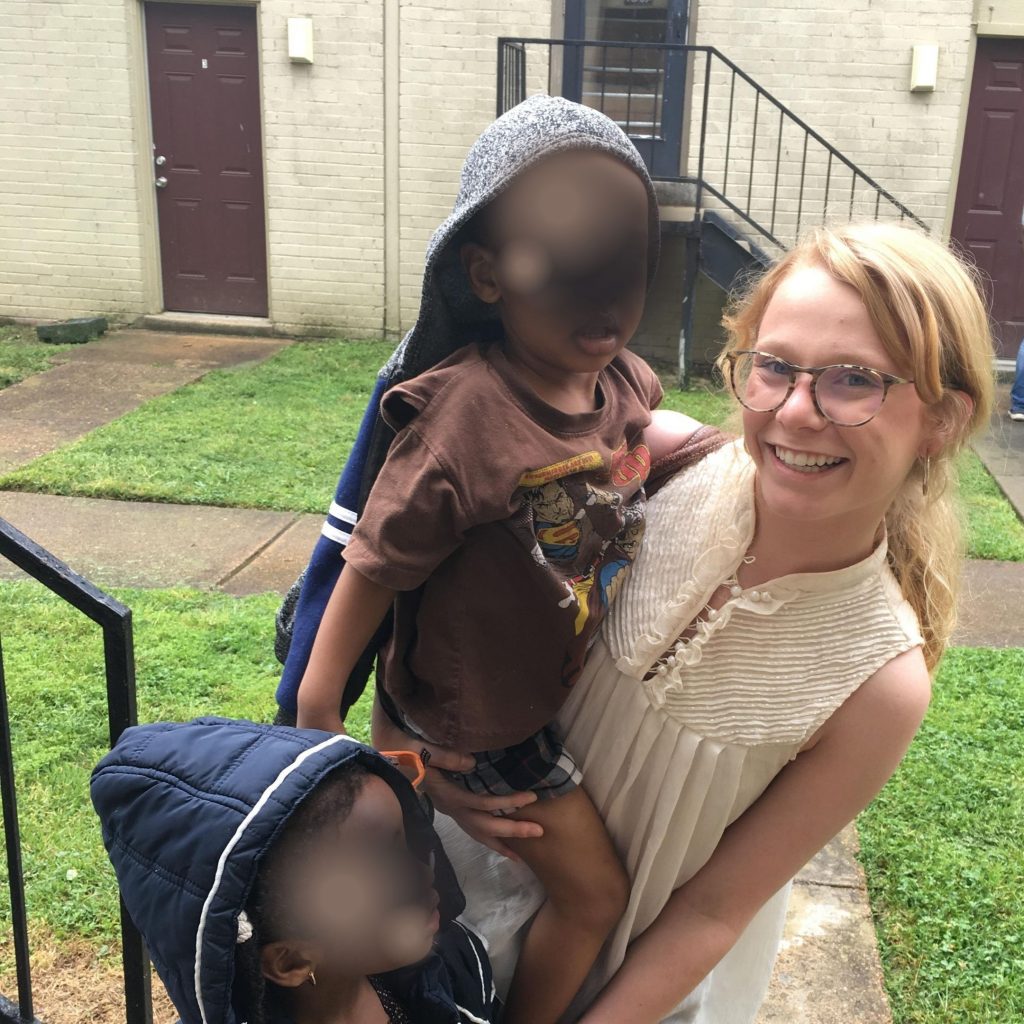
Savannah’s favorite memory from her time at World Relief is the relationships she built, especially with one particular Muslim family from East Africa. Mohamed, Amina, and their two children had lived in a refugee camp for six years before being invited to enter the United States as refugees. When they arrived, Savannah was at the airport to greet them, and walked alongside them as they adjusted to life in Memphis. She provided transportation and support for both Mohamed and Amina, who was pregnant, at their initial medical and social services appointments after arriving. These included Amina’s prenatal care visits, a topic which Savannah didn’t know much about herself. But she was able to learn alongside Amina, including researching related topics on her own to provide better support. Through accompanying the family to their appointments, Savannah built relationships with every family member as she helped them navigate the systems and culture of the United States. During one of these appointments in the springtime, she had an opportunity to share some of the background and celebrations of Easter after Mohamed asked her a question about the upcoming holiday. That same conversation led to him sharing about the Muslim tradition of Ramadan with her, resulting in mutual respect and better understanding for both of them.
Savannah is grateful for the opportunity she had to both contribute toward and learn from the diversity of Memphis. At the end of the semester, she left with a desire to work in a cross cultural environment and to visit a new place, as she had been inspired by the resilience demonstrated by World Relief program participants. This hope led her to a study abroad experience the following summer in Israel, where she worked with refugees displaced from the Israeli-Palestinian conflict. She was also able to explore some of the themes she learned about in her internship in an academic context. Her undergraduate senior thesis was on the topic of resettlement policy and recently changed policies’ impact on the work of World Relief and other similar organizations. Her experience at World Relief instilled an interest in this area and gave her impactful experiences and connections from which she could draw in future endeavors.
Before the pandemic hit, she was on track to leave this coming September for a position with the Peace Corps in Morocco. She still hopes that opportunity develops, but has shifted her plans this year to pursue biblical justice for marginalized populations through a Christian fellowship program in New York City. Her time at World Relief changed the way she viewed the church’s role and responsibility to reach out to their vulnerable neighbors, leading her to highly value this trait in a church body. She points the focus back to Jesus as he routinely uplifted people and populations without power in his society. She has had the opportunity to engage with other believers on this topic, even helping to shift some of her family members’ mindsets toward political questions of immigration by discussing these issues through the lens of shared humanity and generosity.
When asked what her advice is to college students considering this internship, she said, “If you have time you should do it, and if not you should make time for it!” We couldn’t agree more!
By Sarah Barnett, Communications Intern
To learn more about our internship programs, read more HERE. Now’s the time to apply for an internship with us!










